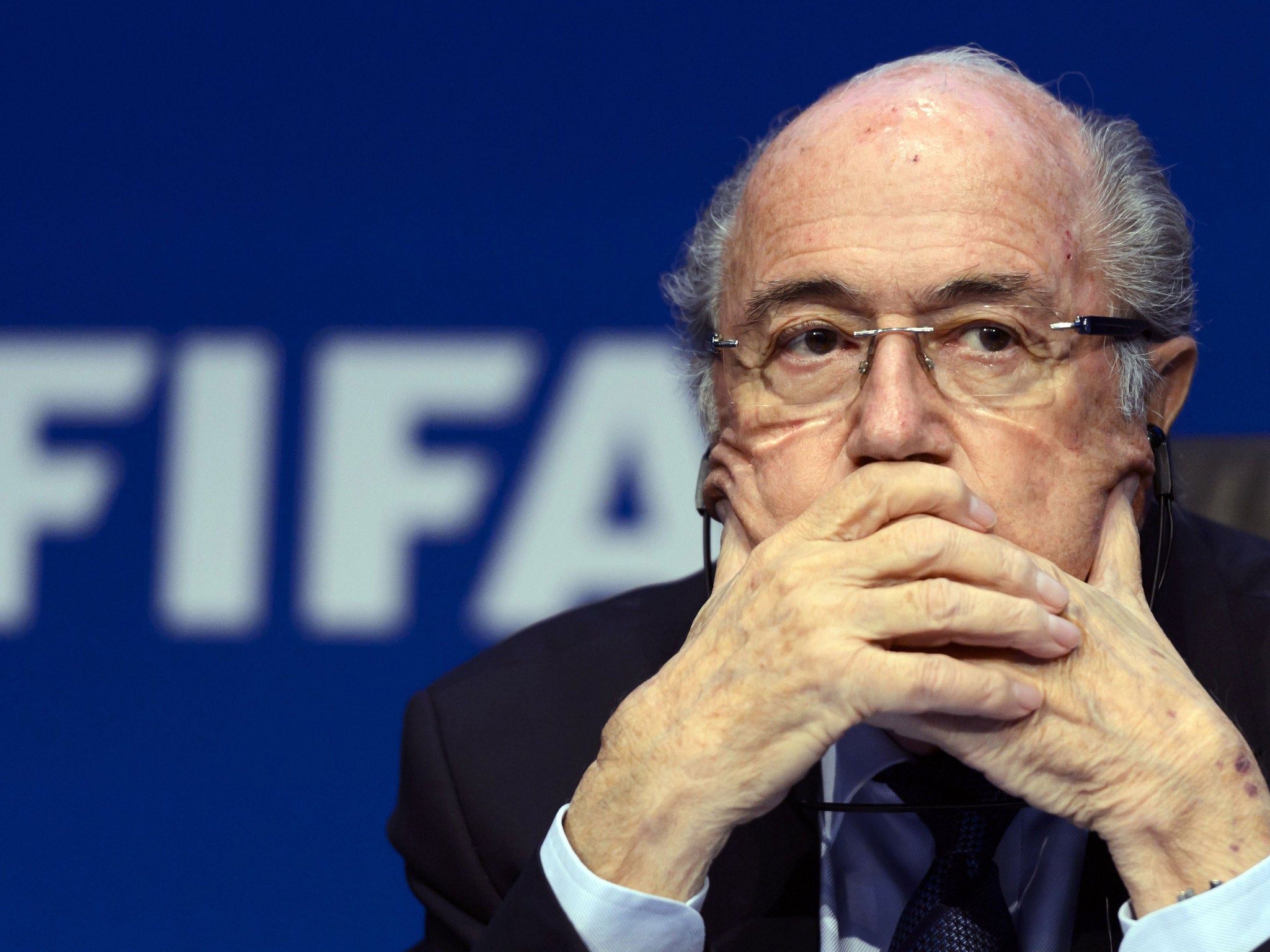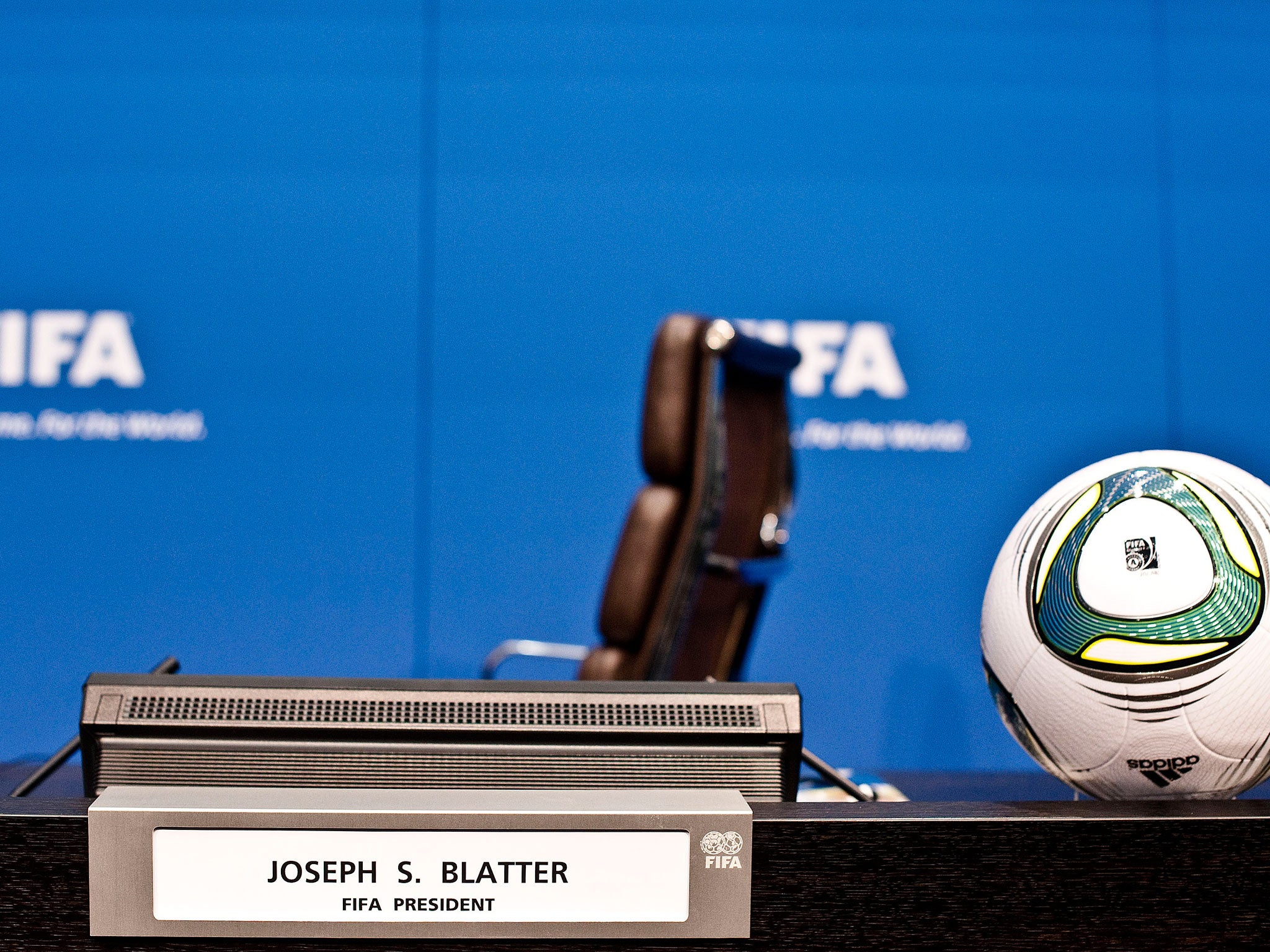Fifa corruption scandal: Sepp Blatter resigns as president of football organisation
The football organisation has been embroiled in a corruption scandal of an unprecedented scale

Your support helps us to tell the story
From reproductive rights to climate change to Big Tech, The Independent is on the ground when the story is developing. Whether it's investigating the financials of Elon Musk's pro-Trump PAC or producing our latest documentary, 'The A Word', which shines a light on the American women fighting for reproductive rights, we know how important it is to parse out the facts from the messaging.
At such a critical moment in US history, we need reporters on the ground. Your donation allows us to keep sending journalists to speak to both sides of the story.
The Independent is trusted by Americans across the entire political spectrum. And unlike many other quality news outlets, we choose not to lock Americans out of our reporting and analysis with paywalls. We believe quality journalism should be available to everyone, paid for by those who can afford it.
Your support makes all the difference.Sepp Blatter’s 17-year reign at the top of football came to a sensational end amid new claims that there must be a ‘‘smoking gun’’ behind his departure.
In a hastily arranged press conference at Fifa’s Zurich headquarters, just four days after having been elected president of the sport’s governing body for a fifth term, the 79-year-old Swiss man announced his departure.
“While I have a mandate from the membership of Fifa, I do not feel I have a mandate from the entire world of football – the fans, the players, the clubs, the people who live, breathe and love football as much as we all do at Fifa,” he said. “Therefore, I have decided to lay down my mandate at an extraordinary elective congress. I will continue to exercise my functions as Fifa president until that election.”
But his explanation was immediately ridiculed by the FA chairman, Greg Dyke. In a scathing attack on the Fifa president, who said he would step down at an extraordinary Fifa Congress to be held between December and March, Dyke said that there must have been a major change in Blatter’s situation between 29 May and the evening of 2 June, when he stunned world football by announcing that he was to step down.
“I don’t believe a word of this he said. “If he believes that, why not step down last week when we asked him to? He was cock-a-hoop when he won [the election] and terribly arrogant. Clearly there is a smoking gun of some sort. This is nothing to do with Mr Blatter being honourable. He hasn’t been honourable for years.”
Despite his long reign being permanently beset by scandal, Mr Blatter had appeared unassailable. The relentless efforts of investigative journalists, politicians around the globe and his enemies in the football world had – for years – failed to unseat him. In the end it took the intervention of the new US Attorney General Loretta Lynch finally to bring the president down.
Mr Blatter’s demise will leave the Fifa allies who secured his re-election on Friday – including football federations in Africa, Asia and South America – fearful for their own prospects, as the FBI and Swiss prosecutors hunt for further evidence of corruption. There will also be renewed calls for Russia and Qatar to be stripped of their 2018 and 2022 World Cups – something Mr Blatter had always ferociously resisted.

The day began with the revelation that a $10m (£6.5m) payment made by Fifa to the disgraced Trinidadian football executive Jack Warner at the request of the South African government had come via a letter sent to Jerome Valcke, Fifa’s secretary general.
This payment, in the view of US investigating authorities, was a bribe for Mr Warner who had voted for South Africa to host the World Cup, and the presence of Jerome Valcke’s name on the letterhead confirmed what has been suspected for years but never proved – that corruption at Fifa rose right to the very top.
Mr Blatter had been defiant, after Swiss authorities acting on behalf of the US Department of Justice dragged a clutch of Fifa’s top officials from their beds at Zurich’s Baur au Lac hotel last week, and indicted them on charges of fraud, money laundering and racketeering.
“I cannot monitor everyone all of the time,” Mr Blatter said. “If people want to do wrong, they will also try to hide it.”
After his re-election on Friday, in the wake of the worst scandal in the organisation’s history, he displayed almost no contrition, promising only to take revenge on his enemies, and talking of a conspiracy between the “British media and the US”.
There can be no doubt that the British media has been relentless in its pursuit of Fifa: from proven bribery, corruption over rights and ticketing scandals that pre-date even Mr Blatter’s presidency, to photographs of envelopes stuffed with thousands of dollars, and the leaking to The Sunday Times of thousands of documents that allege corruption in Qatar’s successful pursuit of the World Cup.
All these things have pushed Fifa close to the tipping point, but it was the decision of monstrously corrupt American Chuck Blazer to turn FBI informant that finally provided the proof on which the law could act. Mr Blatter’s resignation doesn’t end either of the current Swiss or US investigations into illegality at Fifa. His sudden change of heart, from a position of defiance, only further confirms what he has already publicly admitted: that these are dark days for Fifa and “there will be more in the weeks and months to come”.
The journalist Andrew Jennings, who handed the FBI many of the Fifa documents, has said that “Sepp Blatter is a target”.
Nor will it end the questions over whether Mr Valcke knew about the payment, or whether it was corrupt. When the press conference was called with just an hour’s notice, it had been suspected it was to announce Mr Valcke’s resignation, not the president’s. Mr Valcke still faces a fight to keep his job.
The arrest of Concacaf’s new president last Wednesday, the Cayman Islands banker Jeffrey Webb, confirmed that in the words of the US Attorney General Loretta Lynch, “corruption spans two decades”. Mr Blatter’s departure, which will not formally take effect until a new presidential election can be held sometime between December and March, will not reform Fifa overnight.
The Culture, Media and Sport Secretary John Whittingdale warned: “This is only the beginning of the process of change we need to see. I sincerely hope this is the first step to a new Fifa that can command the confidence and respect of the football world once again.”
Fifa’s revenues exploded under Mr Blatter’s presidency, and much of that money has been redistributed to grassroots football in the world’s poorest places. But having so traduced the reputation of his organisation, and his own, Mr Blatter will not be judged favourably by history.
The chairman of the Football Association, Greg Dyke, simply said: “He has stood down. He’s gone. Let’s celebrate.”
Join our commenting forum
Join thought-provoking conversations, follow other Independent readers and see their replies
Comments